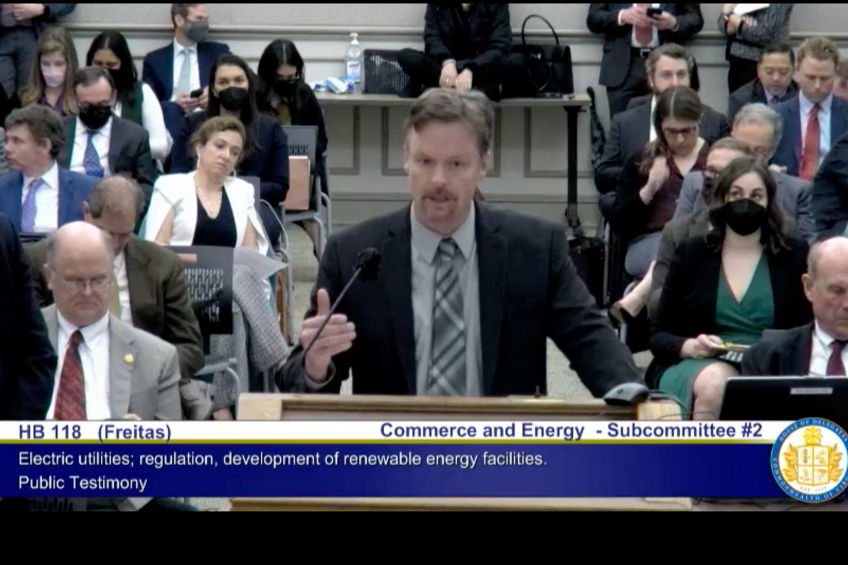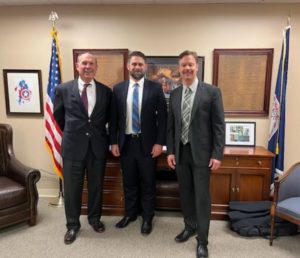
https://www.cfact.org/2022/02/06/cfact-blasts-virginias-clean-economy-act-blunder-with-facts/
CFACT called for action and you answered!
On Tuesday I delivered CFACT’s testimony regarding a bill that would roll back the “Virginia Clean Economy Act” (VCEA) — an aggressive renewable energy initiative that is both an environmental and energy disaster.
CFACT”s friends and supporters used the Virginia House of Delegates legislative portal to submit well thought out, insightful comments.
Your response helped comments favoring smart energy policy and genuine environmentalism to outweigh those submitted by the anti-energy Left by a hefty margin of seven to one!
We posted detailed analysis along with my full testimony to CFACT.org.
As I explained to the sub-committee, if all the solar projects currently being proposed in Virginia are contructed, “they would cover an area of 778 square miles, equal to 330,000 football fields, 35 times the size of New York City, larger than Albemarle County, and 1.5 times the size of Loudon County.”
Moreover, “they are not being constructed on land zoned for industrial or commercial use. Rather, in most cases the developers have chosen to seek special use permits from Counties to site them on land zoned and master planned for agricultural and forest use.”
In short, wind and solar power generation is so inefficient that it requires tremendous areas of land to operate. Virginians do not want our unspoiled forests, shores and mountain tops transformed and our wildlife driven off. Who does?
Every wind turbine and solar panel erected raises rates and weakens the electric grid.
People are waking up and the push back has begun.
Thank you to everyone who added your voice to CFACT’s to tell the Virginia House of Delegates that the Virginia “Clean” Economy Act is a tragic mistake that must surely go.
#
Craig Rucker’s Full testimony:
On February 3, 2022, CFACT President Craig Rucker testified to the Commerce and Energy Subcommittee of the Virginia House of Delegates in opposition to the Virginia Clean Economy Act (VCEA).
The VCEA, signed into law in 2020, mandates Virginia’s electric grid transition to 100% so-called “clean” energy by 2050. The  law is going to drastically increase energy prices and destroy much of Virginia’s forests and farmland in order to build solar facilities.
law is going to drastically increase energy prices and destroy much of Virginia’s forests and farmland in order to build solar facilities.
At the subcommittee hearing, the bill aiming to repeal the VCEA (HB 118, sponsored by Del. Nick Freitas) was reported out favorably and referred to the full House Commerce and Energy Committee for consideration.
This is in large part thanks to all of CFACT’s supporters who took the time to comment on the bill and lay out why the VCEA is terrible for our environment and economy. Thank you! Virginia is one step closer to getting rid of this harmful climate law.
Yet not everyone was in favor of repealing the VCEA at the hearing. Several Left-wing environmental groups, including Virginia Advanced Energy Economy, the Sierra Club, and Virginia Conservation Network testified against repealing the VCEA.
What was most strange was that they were all in agreement with Dominion Energy – Virginia’s largest energy utility. Dominion testified against repealing the VCEA as well. Dominion isn’t eager to lose all the government subsidies in the VCEA; no matter the negative impact such programs are going to have on consumers.
Thankfully, despite these groups’ testimonies (filled with false claims and faulty arguments), a majority of the subcommittee voted to advance the bill repealing the VCEA to the full committee.
Here is Mr. Rucker’s testimony in full submitted to the subcommittee in opposition to the VCEA:
My name is Craig Rucker. I am president of the Committee for a Constructive Tomorrow (CFACT). I have resided in Berryville, VA for many years.
CFACT is a Washington DC-based non-profit organization founded in 1985 with the purpose of prospering lives, promoting progress, protecting the Earth, and providing education. Today, CFACT’s mission continues as it has grown into one of the leading public policy organizations discussing energy policy, environmental issues, technology, and human welfare. CFACT has an extensive scientific and policy advisory board, has attended virtually every United Nations climate change summit, sponsors a national Collegians student outreach program, and participates in the public policy world on multiple fronts.
Since the time the Virginia Clean Economy Act (VCEA) was enacted in 2020, CFACT has been a vocal critic of the policies underlying this radical, partisan, and extremist legislation. The VCEA was founded upon highly questionable scientific claims. It was rammed through the Virginia legislature without adequate consideration of its economic costs and demonstrable harm to Virginia forests and farmland.
CFACT is not a partisan organization, but it is vitally interested in the facts and science underlying energy policy in America, and it is our view that the VCEA is founded on a fundamentally flawed perspective on climate change. For that reason, we have published numerous articles by our contributors which describe and reveal the pernicious effects of this legislation.
For example, these authors and articles include the following: “Destroying Virginia’s Environment to Save It” by Paul Driessen; “Energy Via Legislative Diktat in Virginia” by Charles Battig; “Virginia’s Latest Folly – Offshore Wind Power” by Dr. David Wojick; “CFACT Makes It Official: The Virginia Clean Economy Act is a Disaster” by Collister Johnson; and “Virginia’s Massive Mistake” written by myself. I have submitted copies of these articles for the record.
The VCEA is indeed a disaster. I will speak to two areas where we maintain that the VCEA constitutes a public policy nightmare.
Removing Oversight of the State Corporation Commission (SCC)
The SCC has been embodied in the Virginia Constitution since 1902. One of its most important duties is regulating the public utilities which supply electricity to Virginia consumers. Because Virginia’s primary electric utilities – Dominion Energy and Appalachian Power – are regulated monopolies, they are entitled to a statutory return on equity, plus reasonable expenses. This monopoly power is supposed to be kept in check through the oversight of the SCC, which maintains electricity rates, in lieu of competition, at levels which are “in the public interest.”
For the first time in Virginia history, the VCEA completely removes any meaningful SCC oversight authority by declaring that all solar and wind projects required to meet the mandated Renewable Portfolio Standard are, by legislative fiat, deemed to be “in the public interest.” Therefore, instead of having the ability to opine on the relative merits of competing electrical generation modes – coal, petroleum, natural gas, nuclear, wind, solar, biomass, and so forth – the SCC is presented with a fait accompli. All wind and solar projects are “in the public interest.” Thus, the SCC is left with choosing the least bad method of fulfilling the only two generation options made available to it: solar – which is the most unreliable of all generation modes, and offshore wind, which is the most expensive.
The arrogation by the Legislature of the duties and judgement of the one body constitutionally required to oversight authority of Virginia’s electric utilities is truly one of the most unfortunate aspects of the VCEA.
Destruction of Forests and Farmland
As shown by the state-wide map of proposed solar projects prepared by the Suburban Virginia Republican Coalition, there are 440 solar projects in 70 Counties pending governmental and regulatory approval. If all these projects are constructed, they would cover an area of 778 square miles, equal to 330,000 football fields, 35 times the size of New York City, larger than Albemarle County, and 1.5 times the size of Loudon County. They are not being constructed on land zoned for industrial or commercial use. Rather, in most cases the developers have chosen to seek special use permits from Counties to site them on land zoned and master planned for agricultural and forest use.
The reason why is simple. Rural forest and farmland are abundant and cheap. But this kind of land is zoned that way for a reason – to preserve the rural atmosphere of the Counties for the benefit of its citizens. Industrial facilities should be placed in or near other industrial and commercial zones.
Solar factories require the clear cutting and topsoil removal of most of the acres of the proposed factory. And each acre will be covered with approximately 300 solar panels, weighing a total of over 5 tons. Most of these solar panels are made in China. At the end of their useful life, they must be removed – another extensive undertaking being that they contain toxic chemicals, such as cancer-causing cadmium. We have seen from recently constructed solar factories, like the massive, 6,000-acre Fawn Lake facility in Spotsylvania County, that it is unclear whether the developers have provided an adequate escrow fund to finance the removal of the panels at the end of their useful life. If not, Spotsylvania County and Virginia are facing a potential Superfund cleanup site.
The VCEA also removes the Department of Environmental Quality from effective oversight of solar facilities. The law contains the so-called “permit by rule,” which exempts from DEQ regulation solar projects less than 100 megawatts in size, approximately 90% of the total. This means that the DEQ is effectively neutered from regulating the stream siltation and soil erosion which has been documented in many of the solar projects constructed to date.
In summary, this record clearly establishes that the VCEA is bad for consumers, bad for the environment, and based on fundamentally flawed public policy. We respectfully request that those facts are taken into consideration for all future deliberations.
Author
 CFACT
CFACT
CFACT, founded in 1985 by Craig Rucker and the late (truly great) David Rothbard, examines the relationship between human freedom, and issues of energy, environment, climate, economics, civil rights and more.


